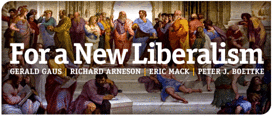Gaus’s vision of public reason liberalism is unique in that it is grounded in a rational actor approach, but doesn’t equate human rational actors with robot rational actors, as is often done in economics and philosophical literatures. The puzzle for such robot rational actors is how disagreement would ever emerge in their interactions. The agreement theorem of Robert Aumann is widely accepted by decision theorists. Mature and rational actors will not have to agree to disagree because if they are truly rational they will not disagree. Bayesian updaters will converge on an agreement.
But what about a world where the actors do not share common knowledge? What about a world where individuals do not mechanically update, but instead must interpret the meaning of the dissonance between their expectations and their realizations? What about a world where human actors exhibit weakness of will, or possess conflicting desires that they must choose between? Actors in this environment will form not abstractly rational expectations, but theory-consistent rational expectations that guide their decision making within an uncertain world.
Elinor Ostrom’s work on real constitution making from the ground up in a variety of social circumstances and over time is grounded in what she calls “a behavioral approach to the rational choice theory of collective action.” In short, her work leads us to engage in rational choice theory as if the choosers were humans, and institutional analysis as if history mattered. Her work is to be contrasted with idealized constitution making that is abstract and exogenous to the social system for which it is intended to provide a structure of governance.
Enter Gaus’s philosophical discussion of the order of public reason, which I see as an effort to have rational actors that reflect not robots, but human beings who are forever caught between alluring hopes and haunting fears, yet still come to a set of rules that enable them to live better together. This requires real institutions that are grounded in the lived experience of those who agree to them so they possess legitimacy. Institutions cannot just be put in place wherever and whenever we want. There are constraints to the imposition of rules. In a very significant way, as Elinor Ostrom’s work demonstrates, rules are only rules if customary practices already dictate them to be so. Rules that do not build on the already existing de facto rules will not stick. Rules that are neither legitimated nor enforced are worthless. Constitution making from the ground up raises serious challenges to the transplanting of rule systems to alien environments from the top down.
There is a radical diversity of social rules that produce cooperation among heterogeneous rational human actors. But this diversity often belies an important homogeneity in function. It is important to distinguish between rules in form (which have great diversity across cultures and over time) and the function the rules serve. Consider the rules that govern resource use in a community. We can have rules in form such as private property and collective property and all sorts of mixes in-between. But the function that these rules must serve is more uniform, and they must do the job that private property would do if it was the form in use. They must (a) limit access to the resource, (b) assign accountability to the user of the resource, and (c) establish graduated penalties for violators of the rules.
Real rules about resource use, exploitation, transfer, and destruction must provide the function of limit, assignment, and penalties. For social cooperation to be realized there has to be wide-scale agreement on this function of rules. Not only will social cooperation be impossible without agreement on the limiting, accountability, and penalty/enforcement function, but the desired social stability will break down.
Kevin Vallier translated the position I tried to carve out in my original reaction essay to making a distinction between “rules we disagree about” and “rules that we disagree within.” I am comfortable with that language. This distinction takes Buchanan’s categories of pre- and post-constitutional levels of analysis and applies them to this case of political and social philosophy. My point is that while we may disagree about the form of rules of property use, ultimately social order turns on the legitimacy and enforcement of the function of rules that mimic what a private property system would produce.
Under a private property regime, the form and function are most directly aligned and the ambiguity is the least on questions of how, what, and for whom. It is property rights that give content to our ability to express our disagreements about beliefs and opinions. Freedom of the press, for example, follows from freedom to own the means of production involved in the press (paper, machines, etc.). Effective human rights, in short, are ultimately property rights. They must be a part of the framework—rules that we disagree within. Even if the philosopher doesn’t want to admit it, the conditions of our economic existence require that the resource egalitarian must yield to the analytical egalitarian. If not, can we ever hope to realize the gains from social cooperation under the division of labor, and afford the social stability that public reason liberalism promises?

